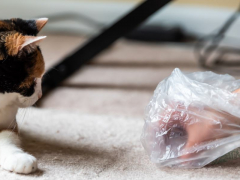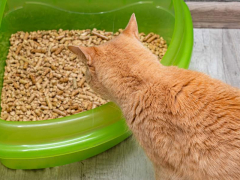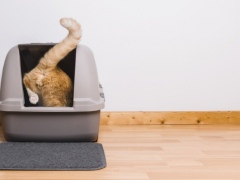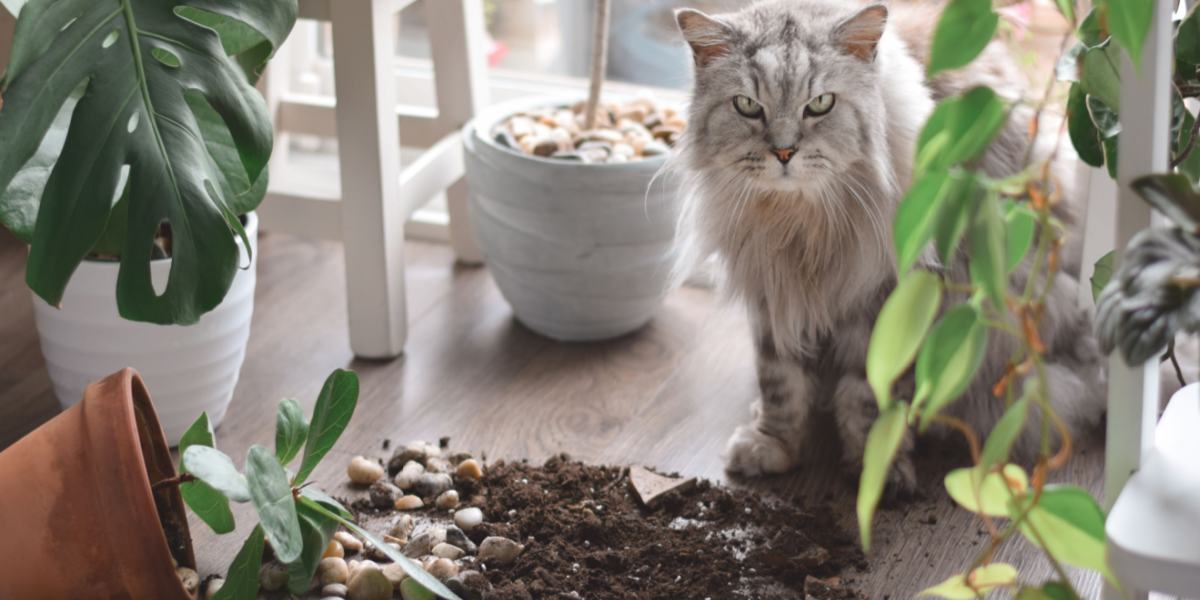
You might find it frustrating or you might find it funny, but we’ve all witnessed our cats knocking things over from time to time.
The internet is full of videos of cats knocking over vases, breaking ornaments, and swiping plant pots off of surfaces. Contrary to the belief of some people, your cat isn’t trying to be annoying. So, why do cats knock things over? Let’s find out.
Why Do Cats Knock Things Over?
As with all unusual cat behaviors, there will be a reason behind your cat’s destructive behavior.
1. Accident
The first and most obvious answer is that your cat never meant to knock over the item in the first place. Precariously balanced possessions might take a tumble as your cat accidentally brushes past them.
Occasionally, your cat might misjudge a jump and knock something over, especially if they weren’t expecting it to be there. On the whole, cats are not clumsy animals, and often it is obvious that their behavior is deliberate. So, what other reasons are there?
2. Hunting Instinct
Cats are natural predators and many of their behaviors can be linked back to their ingrained hunting instincts. Cat paws have lots of nerve endings which makes them very sensitive. By patting, knocking, and swatting objects in their environment, cats are gaining valuable information that helps them decide whether that object is safe or not. Have you ever watched a cat “play” with their catch?
A cat might catch a mouse and then encourage it to run by giving it a bat with their paw, before catching it again. It might seem cruel to us, but this is actually an evolutionary behavior that has developed to allow cats to make a successful kill when they need to.
Cats are opportunistic hunters, which means that they must always be prepared to hunt when the chance arises, even if they’re not hungry. A cat’s hunting instinct is so strong that even inanimate household objects are sometimes treated as “prey.”
So, the next time you see your cat batting your pen around the desk or knocking books from shelves, they just could be acting on that natural predatory instinct.
3. Boredom
Cats are intelligent animals and if they are not provided with sufficient mental stimulation then they can become bored. This is especially true of indoor cats that do not go outdoors. Bored cats are more likely to play with household items, such as ornaments and plants, in an attempt to keep themselves entertained.
An object on a surface that moves when batted with a paw can be a good game, especially when this batting results in the item falling to the ground. Just like children, a bored cat is more likely to go looking for trouble!
4. Attention Seeking
Another possible reason for your cat knocking things over is to get your attention. Cats are smart and they will quickly learn that a fallen or broken item will have you running to pick it up. Their attention seeking might be a result of boredom and your cat might be trying to encourage you to interact or play with them.
Some cats have learned that if they start knocking things over around meal times, their owner will feed them as a way of getting them to stop.
How Can I Stop My Cat From Knocking Things Over?
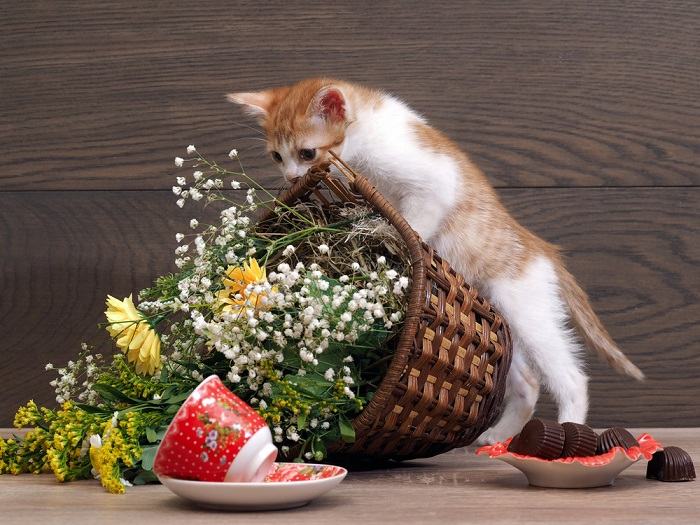
Engaging your cat with attention and play is one of the best ways to keep them from knocking things over.
Scolding cats rarely works and it’s unlikely your cat will associate you telling her off with knocking over the item, especially as she was probably only meaning to play with it anyway. There are several ways in which you can deter your cat from knocking over your precious household items, without telling her off.
1. Alleviate Boredom
Be sure to spend some time each day interacting and playing with your cat. Cats need plenty of mental stimulation and this is particularly true if they do not go outside. Outside, cats can create their own mental stimulation by exploring their territory, playing with plants, chasing butterflies, and hunting prey.
Indoor cats have fewer opportunities to play and hunt and therefore are more likely to create trouble in your house in an attempt to keep themselves entertained. Catnip toys, feather teasers, and ball games are some great examples of toys that you can use to entertain your cat.
However, you don’t need to spend any money at all to play with your cat. New toys in the form of scrunched-up balls of paper or tin foil, cardboard boxes, and the cardboard insides of toilet paper rolls will all provide much entertainment for your kitty! Remember to rotate your cat’s toys so that they remain novel and interesting.
Keep play sessions short so as not to overtire your cat. A few minutes of interactive playtime several times a day is much better for your cat than one long session. Regular playtime will also help keep your cat fit and help prevent them from becoming overweight.
If your cat spends long parts of the day without company then be sure to leave them some interactive toys to play with while you’re out. Treat dispensers, puzzle toys, cat trees, and ball runs can make great toys for cats to play with on their own, and these are especially good as they all require cats to bat them with their paws. Toys like this are more likely to divert cats’ attention away from knocking over household objects.
2. Do Not Give Attention for Knocking Things Over
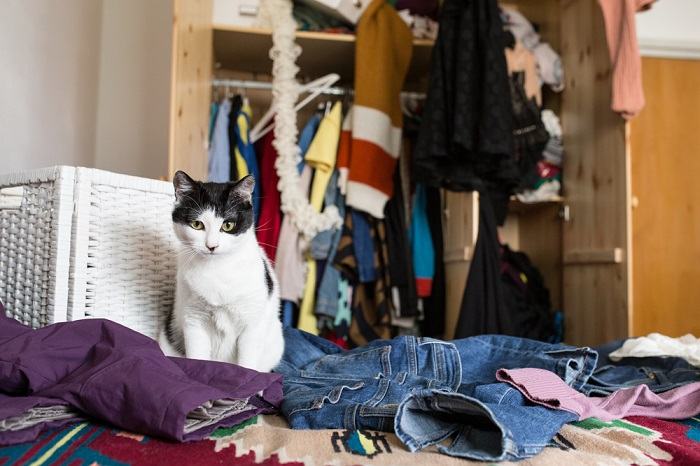
Cats soak up any attention you give them, even if it consists of you scolding them.
If you suspect your cat knocks things over to get your attention, then the best course of action is to completely ignore the behavior. This can be easier said than done, but as long as whatever your cat is playing with is not dangerous, it’s best to simply leave the room when your cat starts batting at something they shouldn’t.
Don’t be tempted to pick up your cat or push them off of the side as this is still ultimately providing attention. Obviously, if your cat is playing with something breakable or dangerous then move it out of reach.
Be consistent and make sure all of the members of your household are ignoring your cat’s behavior. It might occasionally be funny to watch your cat knock things over if they aren’t valuable or breakable, but your cat cannot be expected to know the difference between these items. Always ignore the behavior, even if your cat is playing with something you don’t mind being knocked off the side.
3. Cat-Proof Your Home
You might need to move precious ornaments into a cabinet or breakable items out of your cat’s reach. Try to make sure there isn’t anything on your tables or counters that is likely to attract your cat’s attention, for instance, a feathery plant in a pot, or an ornament with dangly parts. There might be a room in your house that you could make out-of-bounds for your cat where you can keep some of your more precious items.
4. Consult Your veterinarian
If your cat’s behavior is becoming problematic, speak to your veterinarian for further advice. They might suggest referring you to a cat behaviorist who can provide more tailored help and advice. Feline behavior is a complex subject, after all!
Summary
As we’ve learned, there are all kinds of reasons your cat might knock things over, from acting on their natural instincts to attracting your attention. Remember though, whatever the reason, your cat isn’t knocking things over to annoy you so try not to scold them.
Instead, ensure your cat is receiving plenty of mental stimulation, play and interact with them frequently, and ignore them if they are knocking things over to get your attention.
You might not be able to prevent every accident, but hopefully taking these steps should reduce the likelihood of your favorite ornament getting broken!
Also Read: Why Do Cats Bring You Dead Animals?
